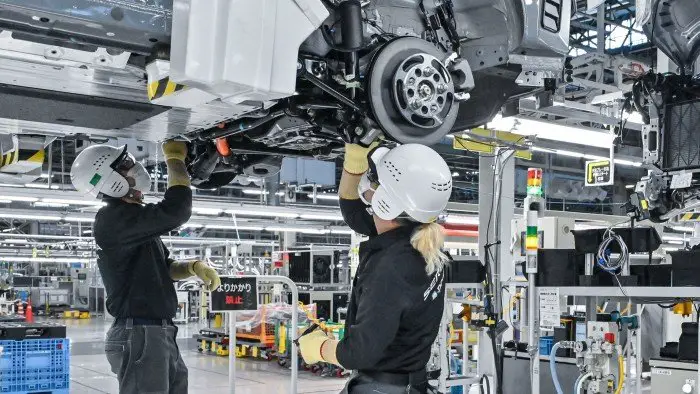Nissan and Honda are in exploratory talks about a merger between the two automakers that would create a Japanese giant valued at $52 billion, people briefed on the matter said.
The two companies are exploring a merger that would help them better compete at a time when traditional automakers are struggling with fast-growing Chinese electric vehicle makers and consumer demand for electric vehicles is slower than expected.
Shares of Nissan rose more than 22 percent in early trading in Tokyo on Wednesday on expectations that a deal would give the company a healthy premium. Honda shares fell as much as 3 percent.
Talks are at an early stage and there are concerns about a possible political backlash in Japan as a merger between two of the country’s most storied car brands could lead to significant job cuts, one of the people familiar with the discussions said.
Nissan And Honda announced in March that they would work together to develop electric vehicles, deepening their discussions amid uncertainty about what Donald Trump’s return as U.S. president will mean for the auto industry.
Before Wednesday, shares of Nissan, which has a cross-shareholding structure with Renault, had fallen 40 percent this year, reducing the company’s market capitalization to $8.2 billion. Honda has a market value of $44 billion.
Based on last year’s sales, the combined company would be the world’s third-largest automaker behind Toyota and Volkswagen, giving it the scale to invest to compete with Tesla and China’s BYD.
Nissan unveiled a contingency recovery plan in November that included: 9,000 job lossesand said it would reduce global production capacity by 20 percent. The company cut its profit forecast for the second time this year after posting a loss in the July-September quarter.
Nissan was looking for one Anchor investor for several months, and the Financial Times reported last month: “all options” were considered, including a merger with Honda.
The merger talks between Nissan and Honda were first reported by Nikkei. Nissan said Tuesday evening: “The contents of the (Nikkei) report have not been announced by either company.”
It added: “As announced in March this year, Honda and Nissan are exploring various opportunities for future collaboration, leveraging each other’s strengths. If there are any updates, we will inform our stakeholders in due course.”
Honda also said that Nissan and Nissan are “exploring various opportunities for future collaboration.”
Renault declined to comment.
Fund managers in Tokyo said they were highly skeptical of a merger because Nissan and Honda’s businesses overlap and large layoffs and writedowns are likely.
“It’s hard to imagine Honda would do this without subsidies or guarantees from the Japanese government, because it’s hard to see which parts of Nissan Honda would really want,” said the head of a large, long-term fund.
In August, Honda and Nissan announced they would launch an electric vehicle by the end of the decade as the two companies agreed to jointly develop software.
A merger between Nissan and Honda would give the enlarged company a significant manufacturing presence in the U.S. and help both brands potentially minimize the impact of Trump’s proposed tariffs on imports from Mexico. Nissan has significant manufacturing facilities in Mexico.
The auto industry also expects Trump, a longtime critic of electric vehicles, to slow their adoption in the U.S., perhaps by watering down emissions regulations.
The combination of Nissan’s low market value and its significant U.S. production capacity has made the company an increasingly attractive target for non-Japanese buyers, M&A bankers in Tokyo said.
“There are certainly companies that are looking at Nissan as a possible way to acquire a U.S. manufacturing presence to avoid future tariffs,” said a banker who has advised several Japanese automakers.
“The price is so low that it is worth it, and so it is not surprising that Nissan would have sought a domestic merger to protect against this.”
A merger would have consequences for Mitsubishi Motors, in which Nissan holds almost 27 percent of the shares, and could become part of the enlarged company. The three brands together have an annual production of around 8 million vehicles.
Nissan is planning a series of product launches to address its deteriorating financial situation after failing to counteract a decline in global sales of electric vehicles with a strong hybrid offering: cars that combine battery power with a traditional internal combustion engine. Selling these vehicles helped Toyota.
Nissan has recently been targeted by activist investors Effissimo Capital Managementa Singapore-based hedge fund known for high-profile campaigns against some of the biggest names in Japan, including Toshiba.
If merger talks between Nissan and Honda continue, the two companies would have to figure out how to reconcile their vastly different corporate cultures.
The Japanese government floated the idea of a Nissan-Honda merger in 2020.
Officials in Tokyo fear that domestic automakers will not be able to compete as independent companies with Chinese rivals in electric vehicles and software, despite concerns about the impact of a merger on employment.
The FT reported last month that Renault was poised to sell part of its stake in Nissan to Honda as part of a restructuring of its 25-year-old alliance.
A person close to Renault said a stronger relationship between Nissan and Honda could “only be positive” for the French group.
Renault reorganized its alliance with Nissan last year, with the French group reducing its stake in the Japanese company to just under 36 percent.
Nissan holds 15 percent of the voting rights in Renault.





